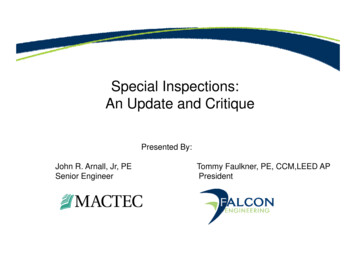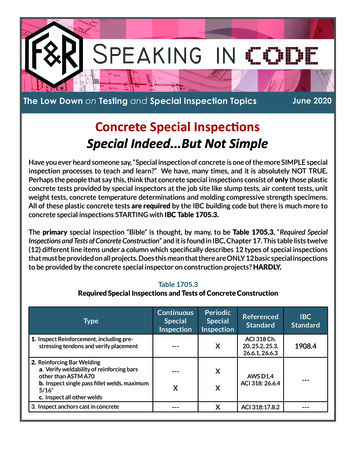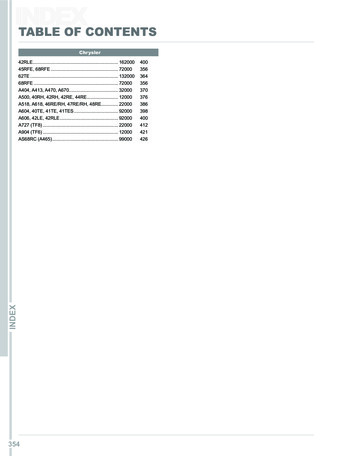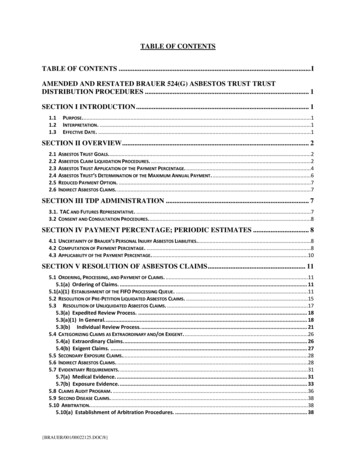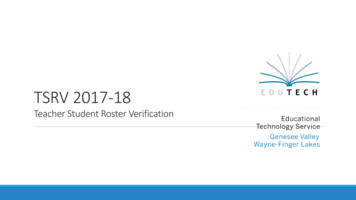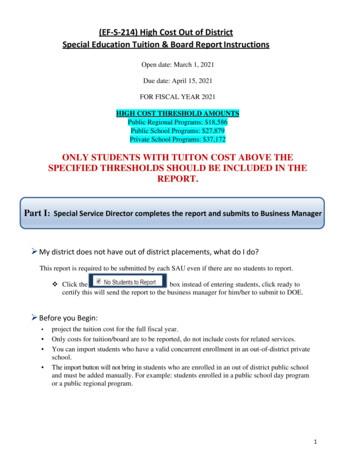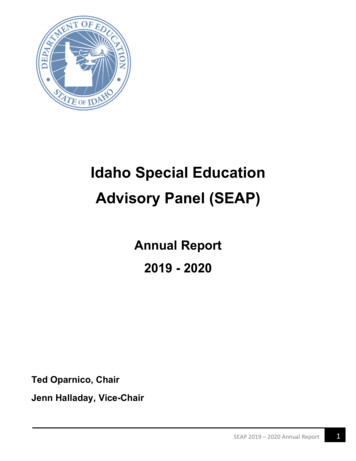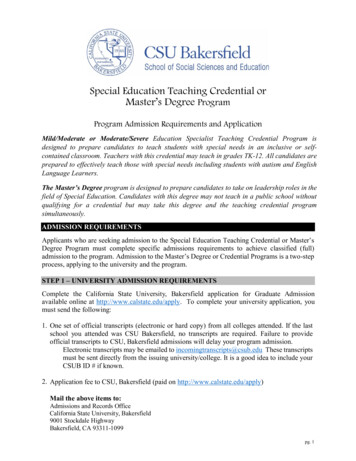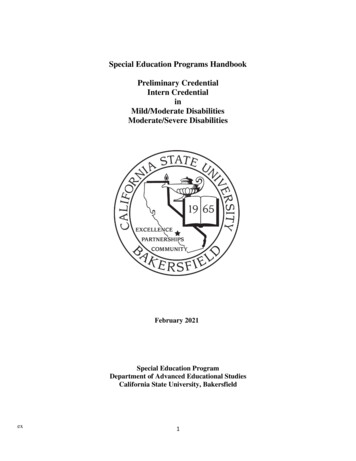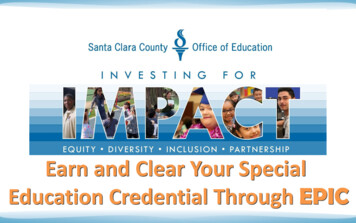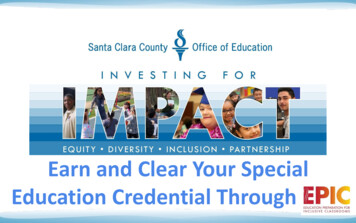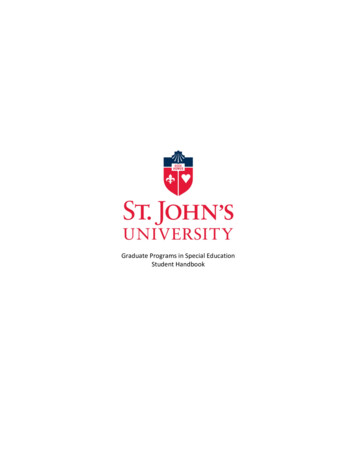
Transcription
Special Education Manual Table of Contents1. Client Documentsa. Sample Retainerb. Releasesi. Sample Release Englishii. Sample Release Spanishc. Suggested Initial Client Interview Topicsd. Sample Records Requeste. Legal Overview of Parent’s Right to School Recordsf. Sample Request for Contact Letterg. Sample Expert Retainerh. Sample Closing Letteri. Parent Advocacy Tipsj. Special Ed Know Your Rights2. Special Education Lawa. Statute and Regulationsi.IDEA (20 USC 1400)ii.IDEA Regulations (34 CFR 300, 301)iii.DC Code Title 5, Chapter 30, Sections 3000-3033iv.Part C Final Regulationsb. Special Education Case Lawi. Case Law Summaries (December 2011)ii. Statute of Limitations (2010)c. New Special Education Legislationi. Special Education Quality Improvement Act of 2014ii. Enhanced Special Education Services Amendment Act of 2014iii. Special Education Student Rights Act of 2014d. Department of Education Office of Special Education Program Advisory Letterse. Other Resources3. Office of the State Superintendent Policies (online at http://osse.dc.gov/service/specialeducation)a. OSSE Part B Initial Evaluation/Reevaluation Policyb. OSSE IEP Process Policy and Memo (August 2011)c. OSSEE Final IEP Amendment Policy (January 2014)d. OSSE Related Services Policy (January 2010)e. Extended School Year (ESY)
i. OSSE ESY Services Policy (March 2011)ii. OSSE ESY Framework Guidance Tooliii. OSSE ESY FAQ Guidancef. OSSE Least Restrictive Environment (LRE) Policy (March 2009)g. OSSE Secondary Transition Policy (January 2010)h. OSSE Transportation Policyi. OSSE Transportation Policy Memo (July 2014)ii. OSSE Transportation Policy )July 2014)i. OSSE Placement Policiesi. OSSE Policies and Procedures for Placement Review (January 2010)ii. OSSE Policies and Procedures for Placement Review – Parent Guide(January 2012)iii. OSEE Policies and Procedures for Placement Review- Guidance (April2010)4. DCPS Policiesa. DCPS Least Restrictive Environment (LRE) Policyb. DCPS Physical Restraint and Seclusion Policyc. DCPS Extended School Year (ESY) Policy (April 2011)d. DCPS Response to Interventions (RTI) Policye. DCPS Memo re: LD-ED Classificationsf. DCPS Policy on Visitors (2013)i. DCPS Policy on Visitors (2013)ii. Visitors Policy Appendix A - DCPS Authorization to Release Recordsiii. Visitors Policy Appendix B - Confidentiality Agreement for Visitoriv. CLC Suggested Addendum – Confidentiality Agreementg. DCPS Bullying Prevention Policy (November 2013)h. Dedicated Aide Reference Guide Update (October 2011)5. Accessing Services: Early Intervention Services for Children Ages 0-3a. OSSE: Early Childhood Landscape in DCb. OSSE: Early Intervention Program FAQc. Early Intervention Sample Documentsd. OSSE Extended IFSP Option Policy (April 2014)6. Accessing Services: Ages 3 and oldera. Early Stages Informationi. Early Stages Parent Guideii. Early Stages FAQ
b. Referral for Services/Request for Evaluation for children over age 5 by parent7. Evaluationsa. Sample Consent for Evaluationsb. Information on Common Evaluations and Interpreting PsychoeducationalEvaluationsc. Sample Evaluationsi. Psychoeducational Evaluations1. Psychoeducational Evaluation for Elementary School Child(example of problematic evaluation)2. Psychoeducational Evaluation for High School Student withEmotional Disturbance (example of adequate evaluation)3. Psychoeducational Evaluation for Child with Learning Disability(example of adequate evaluation)4. Psychoeducational Evaluation for Child with ED/LD/ADHD(example of adequate evaluation)5. Early Stages Psychological Evaluation (example of problematicevaluation)ii. Neuropsychological Evaluation (example of adequate evaluation)iii. Educational Evaluation1. Educational Evaluation for Learning Disabled Student (exampleof adequate evaluation)2. Educational Evaluation (example of adequate evaluation)iv. Speech-Language Evaluation1. Speech-Language Evaluation (example of problematic evaluation)2. Speech-Language Evaluation (example of adequate evaluation)v. Occupational Therapy Evaluation1. Occupational Therapy Evaluation for child with autism (exampleof problematic evaluation)2. Occupational Therapy Evaluation (example of adequateevaluation)vi. Physical Therapy Therapy Evaluation (with explanation of school-basedPhysical Therapy services) (example of adequate evaluation)vii. Assistive Technology Evaluation (example of adequate evaluation)viii. Functional Behavior Assessment1. Functional Behavior Assessment (example of problematicevaluation)2. Functional Behavior Assessment (example of adequate evaluation)3. FBA and BIP for ES Student with Developmental Delayix. Social History Evaluation (example of adequate evaluation)d. DCPS Functional Behavior Assessment Checklist Forme. DCPS Speech Language Eligibility Checklist
f. Obtaining Independent Evaluationsi. Sample Letter Requesting Independent Evaluations (IEE)ii. IEE Authorizationiii. DCPS IEE Parent Guideiv. Blackman Jones DCPS IEE Directiveg. Analysis of Existing Data Formh. Prior Written Notice for Evaluation8. Eligibility for Special Education Servicesa. Fact Sheets oni. ADHD Fact Sheet on Disabilities from NICHCY(http://nichcy.org/disability)ii. Autism Spectrum Disorders Fact Sheetiii. Blindness/Visual Impairment Fact Sheetiv. Cerebral Palsy Fact Sheetv. Deaf-Blindness Fact Sheetvi. Deafness and Hearing Loss Fact Sheetvii. Developmental Delay Fact Sheetviii. Down Syndrome Fact Sheetix. Emotional Disturbance Fact Sheetx. Epilepsy Fact Sheetxi. Intellectual Disabilities Fact Sheetxii. Learning Disabilities Fact Sheetxiii. Other Health Impairment Fact Sheetxiv. Traumatic Brain Injury Fact Sheetb. Disability Worksheets for Eligibility for Special Education (from OSSE/DCPS)i. Other Health Impairment Disability Worksheetii. Specific Learning Disability Worksheetiii. Emotional Disturbance Disability Worksheet9. The Individualized Education Plan (IEP)a. Consent for Services Formb. OSSE Parent Notice of Procedural Rights Manualc. Sample IEPsi. Sample IEP for high school student with EDii. Sample IEP for high school student with ED/LD/OHIiii. Sample IEP for high school student with an intellectual disabilityiv. A. Sample IEP for elementary school student with developmental delayB. Sample FBA/BIP for elementary school student with developmentalv. Sample IEP for elementary school student with austismd. OSSE Blank IEP Form
e. IEP Addendum- Transportationf. IEP Addendum- Behavior Intervention Plang. Dedicated Aide/Paraprofessional Informationi. DCPS IEP Paraprofessional Justification Formii. DCPS IEP Paraprofessional Users Manualiii. DCPS Revised OSE Reference Guide-Dedicated Aidesh. Prior Written Noticei. CLC Tip Sheet: Preparing for IEP Meetingsj. CLC Tip Sheet: Questions to ask at IEP Meetingsk. Sample of Attorney notes from IEP/MDT meetingl. Sample (2) of Attorney notes from IEP/MDT Meeting10. Placementsa. NCLB Teacher Qualifications Request Informationb. DCPS: School Profiles Directoryc. DC Public Charter School Board: Find a Charter Schoold. OSSE LEA Status of Charter Schoolse. MySchoolsDC Lottery Informationf. OSSE Approved Nonpublic Day Schoolsg. OSSE Approved Nonpublic Residential Programsh. OSSE Approved Nonpublic Psychiatric Residential Treatment Facilitiesi. Sample Referral Packet to a Non-Public Schoolj. DCPS Special Education Programs linkk. School and Program Information Toolkit11. Missed Services/Compensatory Educationa. Compensatory Education Authorizationb. DCPS Parent’s Manual for Compensatory Education12. Building a Case/Gathering Informationa. General Questions for a School Observationb. CLC Tip Sheet: Questions to Ask on a School Observationc. Sample School Observation Memo by CLC Investigatord. Addendum—DCPS Confidentiality Agreement13. Litigating a Special Education Casea. OSSE State Complaint Informationi. OSSE State Complaint Informationii. OSSE State Complaint Fact Sheet
iii. OSSE State Complaint Policy and Proceduresb. Student Hearing Office (SHO) Standard Operating Procedure and Filingi. SHO Standard Operating Procedureii. SHO Standard Operating Procedure Amendment re: Expedited Hearingsiii. SHO Standard Operating Procedure January 2010iv. SHO Standard Operating Procedure Repealing §1005v. OSSE Memo Regarding the Filing of Due Process Complaintsvi. OSSE Memo on Due Process Hearing Notice and Hearing OfficerAssignmentvii. OSSE Memo on Standard Practicesc. Student Hearing Office: Orders and Motionsi. Dispute Resolution Disposition Formii. Prehearing Conference1. Notice of Prehearing Conference2. Prehearing Conference: Subjects to be Considered3. Prehearing Conference Orderiii. Motion for Continuance Form Motioniv. Notice to Appear Form Motionv. Hearing Officer Determinations (database info)d. Litigation Samples and Documentsi. Due Process Complaints1. Blank Due Process Complaint Form2. Sample Due Process Complaint for Placement (Student withADHD)3. Sample Due Process Complaint for Placement (Student withMental Retardation)4. Sample DPC for IEE redacted5. Sample DPC for IEE (2) redacted6. Sample DPC for IEE (3) redactedii. Motion for Expedited Hearingiii. Motion for Default Judgmentiv. 5-day Disclosure Letterv. Compensatory Education Plan for Disclosurevi. Direct Examination1. Direct of Psychologist2. Direct of Parent3. Direct of Parent of Teen4. Direct of Non-Public Placement Representative5. Direct of Educational Expertvii. Cross Examinations1. Cross of DCPS Psychologist2. Cross of DCPS Placement Specialist
3. Cross of Special Education Coordinator4. Cross of Special Education Teacherviii. Opening Statementsix. Closing Statements1. Sample Oral Closing2. Sample Written Closingx. Petitioner’s Motion to Shift Burden of Productionxi. Rule 8(b)(6) Motionxii. Possible Due Process Legal Issues Charte. CLC Tip Sheetsi. CLC: Dispute Resolution Cheat Sheetii. CLC: How to File a Due Process Complaint Cheat Sheet14. Disciplinea. IDEA Discipline Regulations: 34 CFR §§ 300.530-537b. DCMR Title 5, § 25c. DCMR Title 5, § 24d. DCPS Student Discipline Policy Tierse. DC Office of Administrative Hearings Emergency Regulationsf. DCPS Suspension Noticeg. DCPS Manifestation Forms for Special Educationh. DCPS Manifestation Forms for 504 Plansi. Sample Letter to Office of Youth Engagement re: Disciplinej. Sample Letter to Instructional Superintendentk. Charter School handbooksl. School Discipline and Bullying Toolkit15. 504 Plans Under Title II of the Rehabilitation Acta. Lawi. ADA Amendments Act of 2008ii. Section 504 Regulations (34 CFR 104)iii. DCPS Student Grievance Procedures (October 2014)b. Department of Education 504 FAQsc. DCPS 504 Plan Formsd. DCPS 504 Parent and Guardian Brochuree. Sample 504 Planf. Office of Civil Rights Complaint Formg. National Disability Rights Network: Obligations of School Districts UnderSection 504 of the Rehabilitation Act of 1973 with Updates on the ADAAmendments Act
16. Other Informationa. DCPS Visiting Instruction Informationi. DCPS Visiting Instruction Formii. Physician’s Verification Form for Visiting Instruction Servicesb. Private and Religious School Officei. DCPS Q&A for Children in Private or Religious Schoolsii. DCPS Private and Religious Office Referral 2010c. Attendance and Truancyi. CLC Tip Sheet: Attendance and Truancyii. Attendance and Truancy Regulations (DCMR Tit. 5, Ch 21)d. Graduation Requirementsi. Graduation Requirements Regulationsii. DCPS Transcript Analysis Worksheete. DC Retention and Promotion Regulationsf. School Transfersi. Transfers Due to Change of Addressii. Immediate Involuntary Transfersiii. Out-of-Boundary Transfersiv. No Child Left Behind School Choice Informationv. High School Selection Transfersvi. Involuntary Transfersvii. Safety Transfer Request Letterg. Common Core Competency Standards Information from OSSEh. OSSE DC CAS Information (year-end testing)i. Key DCPS Contact Informationi. DCPS Office of General Counsel Contact Informationii. DCPS Office Directory (2011)iii. DCPS 2011-2012 School Directoryiv. DCPS Cluster Directoryv. DSCPS Instructional Superintendent Contact Informationvi. DCPS Organizational Chart (2011)vii. Other DCPS Contact Informationj. Mental Health Referralsk. SSI and Public Benefit Referralsl. Landlord Tenant Referralsm. Custody Referralsn. Advocacy Code Cardo. Other School Policies and Resources Toolkit
Healthy Together Project (HT) – Staff ContactsPlease feel free to contact us for pro bono case mentoring:Tracy Goodman, Esq.Healthy Together Director202-467-4900, ext. 503tgoodman@childrenslawcenter.orgKathy Zeisel, Esq.Senior Supervising Attorney202-467-4900, ext. 547kzeisel@childrenslawcenter.orgIf you would like to discuss pro bono opportunities or would like to take a pro bono caseat Children’s Law Center, please contact:Nancy Drane, Esq.Pro Bono Director202-467-4900, ext. 502ndrane@childrenslawcenter.orgIf you would like to be added to our pro bono referral e-mail list, borrow a training DVD,obtain a training manual, or attend one of our trainings, please contact:Gillian SchapsPro Bono and Intake Assistant202-467-4900, ext. 586gschaps@childrenslawcenter.org
Frequently Asked QuestionsChildren’s Law Center’s pro bono attorneys serve more than 400 children and families every year. Allour cases are designed to provide children in the District of Columbia with the solid foundation of family,health, and education we believe they need to succeed. See below for more information and answers tofrequently asked questions regarding our pro bono program.What types of cases does Children’s Law Center offer for pro bono attorneys?Custody Guardian ad litem (CGAL)Pro bono attorneys represent the best interests of children involved in complex custodydisputes between parents or other prospective caregivers. Judges refer these matters directly toChildren’s Law Center when they identify the need for a GAL to represent the child’s bestinterests. CGAL cases are heard in the Domestic Relations branch of DC Superior Court.Caregiver RepresentationPro bono attorneys represent caregivers seeking to provide children with loving homes throughadoption, guardianship, or custody. These caregivers include foster parents, grandparents, andother relatives who want to provide stability for children who are in foster care or at risk ofentering foster care. Caregiver representation cases are heard in the Neglect branch or theDomestic Relations branch of DC Superior Court.Special EducationPro bono attorneys represent parents of children with special education needs that are not beingadequately addressed in the child’s current educational environment. These cases may involveobtaining evaluations, advocating for special education services or challenging the denial ofservices at due process hearings held at the Student Hearing Office of the Office of the StateSuperintendent of Education (OSSE).Housing ConditionsPro Bono attorneys represent parents of children whose health is at risk due to the presence ofenvironmental health hazards in the home. These housing conditions cases may involvenegotiating with the family’s landlord and/or filing a civil case to force the landlord to addresshousing code violations and substandard housing.How does Children’s Law Center identify pro bono cases?Cases are referred to Children’s Law Center from a variety of sources, including the DCSuperior Court, Guardians ad litem for children in the abuse and neglect system, attorneyspracticing in DC Superior Court, social workers, and other legal services organizations.Prospective clients may also call into our Helpline, which is staffed full-time by experiencedUpdated January 2015
intake attorneys. Children’s Law Center conducts extensive screening before we refer cases topro bono attorneys.How can I find out what cases are currently available?CLC emails a list of available cases approximately twice per month. Cases are placed withqualified pro bono attorneys on a first-come, first-served basis. Please contact CLC’s Pro BonoDirector, Nancy Drane, or CLC’s Pro Bono and Intake Assistant, Gillian Schaps, if you wouldlike to receive information about available cases.I have no experience in family law—is that OK? Are there cases that can be matched to my skillset? Will I go to trial?No background in family law is necessary to be a pro bono attorney with Children’s LawCenter. We have worked successfully with many attorneys with no prior family law experienceand/or limited litigation experience. Our trainings, online resources, and mentors are availableto ensure all our pro bono attorneys are well equipped for their cases.All our cases involve oral and written advocacy as well as strong client skills. Some cases aremore likely to go to trial or an evidentiary hearing, while others are less likely. Many casesplace a premium on negotiation skills, legal advocacy, and other pre-trial skills, while some aremore likely to proceed to litigation.We are happy to talk with you about which cases are most likely to match your skills andinterests.What trainings and resources does Children’s Law Center offer for pro bono attorneys?Children’s Law Center regularly conducts training in all four areas of pro bono representation,custody guardian ad litem, caregiver, housing conditions, and special education. Thesetrainings are either full or half days and are conducted at locations around the District. Inaddition to the live training, all attendees receive an extensive reference manual covering theparticular area of representation.CLC also offers on-line versions of our trainings on the pro bono page of our website. Ourwebsite also contains a plethora of additional resources for pro bono attorneys, including powerpoint presentations, model pleadings, the videos mentioned above, and recent training manualsin each area of pro bono representation. Please contact Nancy Drane or Gillian Schaps foraccess to these online materials.Attorneys should attend a relevant training before taking a pro bono case. A list of upcomingtrainings can be found in the pro bono section of our website.Are CLC staff available to support pro bono attorneys throughout the case?Updated January 2015
Experienced attorneys from CLC serve as mentors for our pro bono attorneys. A list of mentorsis available on the pro bono section of our website. Together, these lawyers bring decades ofexperience in family and special education law. We do not “co-counsel” or “supervise” probono attorneys, but we are available to discuss strategy, legal issues, and local family courtpractice. We can also help you identify model pleadings, which you will also find on ourwebsite, and plan for trial or evidentiary hearings.In a limited number of cases, Children’s Law Center will have a conflict and will not be able toprovide mentoring. Whenever possible, we let pro bono attorneys know in advance when aconflict exists and try to identify a third-party mentor to provide the pro bono attorney withsupport.What is the typical time commitment for a pro bono case?Every case and area of pro bono representation is unique. While case circumstances maychange over time, we do our best to evaluate the complexity of a case during the screeningprocess, make every effort to let pro bono attorneys know of circumstances that may make acase particularly complex, and rate cases as beginner, high beginner, intermediate, or advanced.Pro bono attorneys are encouraged to talk to Nancy Drane, CLC’s Pro Bono Director, whenevaluating a particular case to discuss the potential complexity and/or anticipated timecommitment.Am I responsible for costs and fees?Yes, pro bono attorneys are responsible for any litigation costs and other fees incurred duringthe handling of your case. Filing and eFiling fees are waived for Guardians ad Litem and thoseparties with in forma pauperis (IFP) status.Do I have to be licensed to practice law in DC?Pro bono attorneys must be admitted to practice in the District of Columbia or be eligible topractice under District of Columbia Court of Appeals Rule 49(c): Attorneys who regularly practice in anoth
DCPS Organizational Chart (2011) vii. Other DCPS Contact Information j. Mental Health Referrals k. SSI and Public Benefit Referrals l. Landlord Tenant Referrals m. Custody Referrals n. Advocacy Code Card o. Other School Policies
